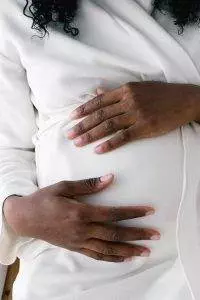by Qineng Tan, L.Ac., Ph.D. and Xiaomei Cai, L.Ac., Ph.D.

Sudden pain right lower abdomen or pain that starts around your navel? Nausea or vomiting? These may be appendicitis symptoms. Appendix pain is a sign of appendicitis, or an infected and inflamed appendix. Acupuncture and TCM offer an adjunct treatment for appendicitis that can help relieve appendicitis pain.
The appendix is a small, tube-shaped organ that extends off of the lower part of the large intestine. What side is your appendix on? The appendix location is in the lower right quadrant of your abdomen.
What’s appendicitis? Appendicitis causes are generally related to infection and inflammation.
The appendix can become blocked by a bacterial infection, a viral infection, a parasite, or a tumor. Sometimes fecal matter gets into the appendix, causing a blockage.
If the appendix becomes infected and inflamed, it can swell and even rupture; this is often called a “burst appendix,” or ruptured appendix.
If the appendix becomes so swollen that it begins to tear or rupture, stool can leak out into your abdominal area and cause peritonitis, a potentially very dangerous infection.
Acute appendicitis is a medical emergency and requires immediate medical attention.
Studies have shown that acupuncture and TCM treatment can help relieve appendicitis pain and swelling and improve outcomes for patients hospitalized for acute appendicitis.
Appendicitis Symptoms

The signs of appendicitis often come on over a short period of time, usually beginning with a sudden pain in the middle of your belly around your navel, and then moving to the lower right side of your abdomen.
Appendicitis symptoms include:
- Sudden pain near or around the navel that migrates to the lower right side
- Sudden pain in the lower right quadrant of the abdomen
- Pain in belly is worse when you cough or are jarred
- Right belly is tender to the touch
- Constipation
- Diarrhea
- Urinary frequency or urinary urgency
- No appetite
- Low grade fever
- Malaise, generally feeling ill
Appendicitis tends to develop through a series of stages. The 4 stages of appendicitis are:
- Early or uncomplicated appendicitis, which is when a blockage has formed and swelling of the appendix begins. At this stage, the pain in the middle of the belly area may be just sort of a vague “stomach ache.”
- The appendix begins to fill with mucus. Without proper blood and lymph drainage, bacteria begin to proliferate inside the appendix.
- The swelling begins to make the tissue of the appendix and the surrounding intestine and bowel walls become stiff, sometimes forming an inflamed mass, which is called an “appendiceal phlegmon.” This can feel like a hard mass in the lower right abdomen when palpated.
- Blocked blood flow causes a lack of oxygen, so the tissues of the appendix become necrotic. At this stage, the wall of the appendix can begin to tear or rupture.
This process usually develops over the course of 12-24 hours. This is why appendicitis is considered a medical emergency. It is very important that anyone experiencing this type of pain and other symptoms seeks urgent care.
Appendicitis Treatments and Appendectomy
Upon being admitted for testing, a person presenting with severe pain in the right abdomen will first need to undergo testing to be sure of a diagnosis of appendicitis.
There are several other conditions which could also cause abdominal pain in this area, including:
- Crohn’s disease
- Mittelschmerz, ovulation pain
- Ovarian cyst that has ruptured
- Ovarian torsion
- Endometriosis
- Ectopic pregnancy
- Pelvic inflammatory disease
- IBD
- Testicular torsion
- Right-sided colitis
- Kidney stone
While undergoing diagnostic testing such as MRI, CT-scan, or ultrasound, it is often common practice for doctors not to administer pain medications, the idea being that to do so might mask symptoms and delay proper diagnosis. This when acupuncture treatment can be particularly helpful. Acupuncture can have a proven analgesic effect for abdominal pain, without any side effects.
In general, appendix surgery is considered the gold standard treatment for acute appendicitis. Appendix removal can be done laparoscopically, or via incision.
Some cases of appendicitis may be treated with antibiotics and other medications over the course of several days or weeks, but often, in a significant number of cases, the appendicitis recurs.
Acupuncture and Chinese herbs can serve as an adjunct treatment for appendicitis patients, helping to relieve abdominal pain, regulate body temperature, and reduce inflammation.
Can Acupuncture Help Appendix Pain?
Appendicitis is an emergency situation, and people should definitely seek immediate medical care if they are experiencing right side abdominal pain and fever.
Acupuncture and TCM herbs can be used as complementary medicine, to help reduce hospitalization time and improve overall outcomes of conventional treatment for appendicitis.
While in some cases, appendicitis surgery may be necessary, there are other options. In some cases a combination of antibiotics to handle the infection, and acupuncture, herbs and moxibustion treatment to help relieve pain and inflammation may help to resolve appendicitis without surgery. This is known as NOTA: non-operative treatment for acute appendicitis.
According to TCM theory, appendicitis is considered to be related to blood stasis and stagnant Qi, as indicated by symptoms like: distended abdomen, nausea and/or vomiting, and a red tongue with a white, greasy coating. If the condition is also characterized by excess heat, then there may also be intense pain and muscle tension in the lower right abdomen, constipation, fever, a dry mouth, and dark-colored urine.

In this situation, an acupuncturist would use acupuncture points targeting the stomach, spleen, and large intestine to help move blood, Qi, and clear heat from the infected area. Moxibustion treatment, which involves burning a small amount of moxa herbs near acupoints, can also help to relieve fever and irritation.
These TCM treatments can help to support and boost the efficacy of conventional medical treatments for appendicitis.
In situations where an appendectomy is indicated, acupuncture and herbs can help speed recovery and help to improve intestinal function after surgery.
One study done on pediatric patients with appendicitis showed that acupuncture helped reduce inflammation and pain.
Another study compared patients hospitalized and treated for appendicitis. One group received antibiotics, pain relief medications, and a special diet. The other group received these treatments, plus acupuncture and herbs. Overall, the patients who received TCM treatment had reduced abdominal pain, more quickly resolved fevers, and were able to leave the hospital days earlier.
Acupuncture, and electro-acupuncture, can also be used to help with recovery and pain relief post-appendectomy, for those patients who do require surgery to remove the appendix.
Acupuncture for Appendicitis Near Me in West Los Angeles
Acupuncture and TCM can often be used in conjunction with conventional medical care as a way to offer additional support for pain relief, recovery, and regaining functionality. In the case of appendicitis, it is vital to seek medical treatment for what can potentially become a life-threatening emergency. Acupuncture and herbs can be used additionally, to help speed recovery from infection, and, when necessary, from surgery. TCM can help patients regain and improve their digestive function.
*This article is for education from the perspective of Traditional Chinese Medicine only. The education provided by this article is not approved by FDA to diagnose, prevent, treat and cure human diseases. It should not stop you from consulting with your physician for your medical conditions. Traditional Chinese Medicine is based on Qi, which is an invisible force that usually cannot be observed by modern science. Because science focuses on testing ideas about the natural world with evidence obtained through observation, these aspects of acupuncture can’t be studied by science. Therefore acupuncture and Chinese herbs are often not supported by double-blind, randomized trials, and they are considered alternative medicine therapies in the United States.
